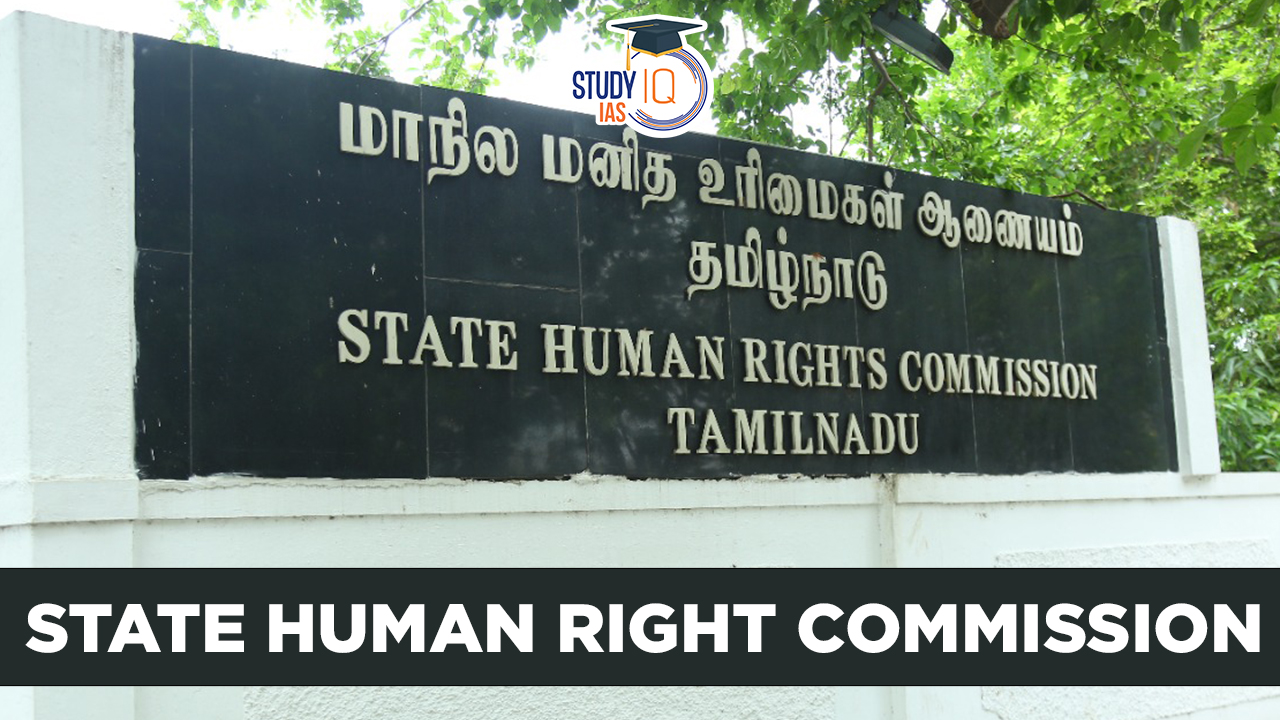Table of Contents
State Human Rights Commission
A statutory body created under the Protection of Human Rights Act of 1993 is the State Human Rights Commission. Only those topics covered under the State List (List-II) and the Concurrent List (List-III) of the Constitution’s Seventh Schedule are subject to investigation by a State Human Rights Commission. In light of this, the State Human Rights Commissions have been established by 26 states via Official Gazette Notifications.
The State Human Rights Commission is an important part of Indian Polity which an important subject in UPSC Syllabus. Students can also go for UPSC Mock Test to get more accuracy in their preparations.
Understanding the State Human Rights Commission
The Protection of Human Rights Act of 1993, which also gave rise to the National Human Rights Commission, established the State Human Rights Commission at the state level. The SHRC is tasked with both defending human rights and investigating cases of human rights violations, however, it is only permitted to address issues that are covered by List II of the State List and List III of the Concurrent List.
The subjects of the SHRC must be those that are listed in the Indian Constitution’s Seventh Schedule. If necessary, the respective State Governments are given the authority to establish a Human Rights Commission for their own state.
Composition of the State Human Rights Commission
The Protection of Human Rights Act, of 1993 requires each state to have a Human Rights Commission to investigate violations of human rights. According to the Human Rights (Amendment) Act, 2006, the Commission consists of three members, including a chairperson.
- The chairperson must be a former Chief Justice of a High Court.
- The other two members include:
1. A sitting or retired High Court judge or a District Judge with at least seven years of experience.
2. A person with expertise or knowledge in human rights.
Members of the State Human Rights Commission
The State Human Rights Commission, or SHRC, is made up of two commissioners and a chairperson. The Governor appoints the members of the State Human Rights Commission. However, the President alone has the power to remove them. The State Human Rights Commission’s chairperson and members are appointed for terms of three years or until they turn 70. The Tamil Nadu government has enhanced the SHRC Chairperson’s and members’ salaries and allowances by approximately 177%. The members would now receive about Rs 2.25 lakh as opposed to Rs 80,000 per month, while the Chairperson will now earn Rs 2.5 lakh instead of Rs 90,000.
Qualifications of State Human Rights Commission
To be eligible as the chairman of the State Human Rights Commission (SHRC), a person must be a retired Chief Justice or judge of the High Court. Members must have at least seven years of experience as a District Judge or must be a retired High Court or District Judge. Candidates should also have some knowledge of human rights. The chairman and members serve for three years or until they turn 70, whichever comes first. The Governor appoints the chairman and members based on recommendations from a committee led by the Chief Ministers and the Speaker of the Legislative Assembly. While the Governor makes the appointments, only the President of India can terminate their terms.
Functions of the State Human Rights Commission
The State Human Rights Commission has several important roles:
- It looks into complaints about human rights violations or negligence by public servants, either on its own or based on petitions from victims or their representatives.
- With court approval, it can get involved in cases related to human rights violations.
- The Commission visits jails and other state-run facilities to check on inmates’ living conditions and make recommendations.
- It examines existing laws and constitutional protections for human rights and suggests ways to improve their implementation.
- The Commission studies issues that prevent people from enjoying their rights, like terrorism, and proposes solutions.
- It carries out research on human rights topics and promotes awareness about these rights and how to protect them in society.
- The Commission supports non-governmental organizations that work on human rights issues.
- It can take on any other activities necessary to promote human rights.
Power of State Human Rights Commission
The State Human Rights Commission has full authority to oversee the entire procedure on its own. It conducts judicial procedures in the same manner as a court and has a full range of authority comparable to a civil court. The SHRC has the jurisdiction to request information about the case from the state governor or any other authority, as well as to demand payment of damages to the victim.
If a direction or order is needed, it may also contact the Supreme Court or the State High Court. Despite all the authority granted to the State Human Rights Commission, it is only required to act in relation to a case within a year of its occurrence; otherwise, it ceases to fall under its jurisdiction. 26 states have established State Human Rights Commissions in their various states as of this writing, and they are successfully working to uphold human rights in those states.
Achievements of State Human Rights Commission
In order to defend and advance human rights in various states, India formed State Human Rights Commissions (SHRCs). 15 members of the Irula tribe who were harassed by the Villupuram police have been awarded compensation totaling Rs. 75 lakhs by the Tamil Nadu State Human Rights Commission.
The State Human Rights Commissions (SHRCs) run various awareness programs to educate people about their rights and the importance of respecting others’ rights. They also help victims of human rights violations who cannot afford legal assistance. For example, the Assam SHRC took the initiative to address fake encounters in the city.
Filing and Admission of Complaints:
Filing Complaints
One of the main roles of the NHRC is to handle complaints about human rights violations. Anyone—individuals, groups, or organizations—can file a complaint. The Commission keeps track of these complaints and assigns each a number. They may ask for more information or affidavits to support the claims.
Admission of Complaints
If the Commission finds a complaint lacks merit, it may dismiss it. However, if the complaint is accepted, the Commission will investigate further and request reports from state governments. A detailed note on the case is prepared for the Commission. If the Commission decides to proceed, its members or investigative staff will conduct an investigation. If they find evidence of human rights violations or negligence by officials, they may recommend criminal charges and seek immediate relief for the victim.
Complaints Related to the Armed Forces
If a complaint involves the army, the Commission requests a report from the central government. If they are satisfied with the report, they won’t pursue it further. If not, they will make recommendations, and the government must respond within three months.
Investigation Wing
The Commission has its own investigation team led by the Director General of Police. They can also use government officers or agencies and have involved NGOs in some inquiries.
Types of Complaints Accepted
The NHRC accepts complaints about:
- Deaths in police or court custody
- Fake encounters involving police, army, or paramilitary forces
- Unlawful detention, extortion, and intimidation by police
- Cases not being registered
- Failure to protect lives and property by police
- Inadequate investigations
- Denial of basic facilities in prisons
- Atrocities against Dalits, such as restricted access to water sources
- Bonded or forced labor
Other human rights bodies
| Name of the body | Objective |
| National Commission for Women | Addressing concerns about women’s rights violations and providing recommendations to the government on policy regarding women. |
| National Commission for Minorities | Development of general policy and planning, coordination, assessment, and review of the legislative framework and development programs for minority populations. |
| National Commission for SC/ST | Protection of Scheduled Castes, Scheduled Tribes, and Anglo-Indian minorities from exploitation in order to develop and preserve their social, educational, economic, and cultural interests. |
| National Commission for Protection of Child Rights | Promotion, and protection of children’s rights, notably those enshrined in the United Nations Convention on the Rights of the Child, 1989, which India signed in 1992. |
| Chief Commissioner for persons with disabilities | Protection and promotion of the economic, social, educational, and cultural interests of disabled persons. |
State Human Rights Commission UPSC
The State Human Rights Commission has made it very apparent that it is eager to work with all facets of society to protect human rights. More people trust this Commission to defend their human rights. Even though the SHRCs have been around for 25 years, many concerns concerning how they work and how effective they are still go unanswered. The credibility and reputation of the panel are at stake. The Commission’s authority and jurisdiction must urgently be increased. Students can read all the details related to UPSC by visiting the official website of StudyIQ UPSC Online Coaching.


 Admiralty (Jurisdiction and Settlement o...
Admiralty (Jurisdiction and Settlement o...
 Enemy Property Act in India, Background ...
Enemy Property Act in India, Background ...
 Phone-tapping in India, Legal Framework ...
Phone-tapping in India, Legal Framework ...





















